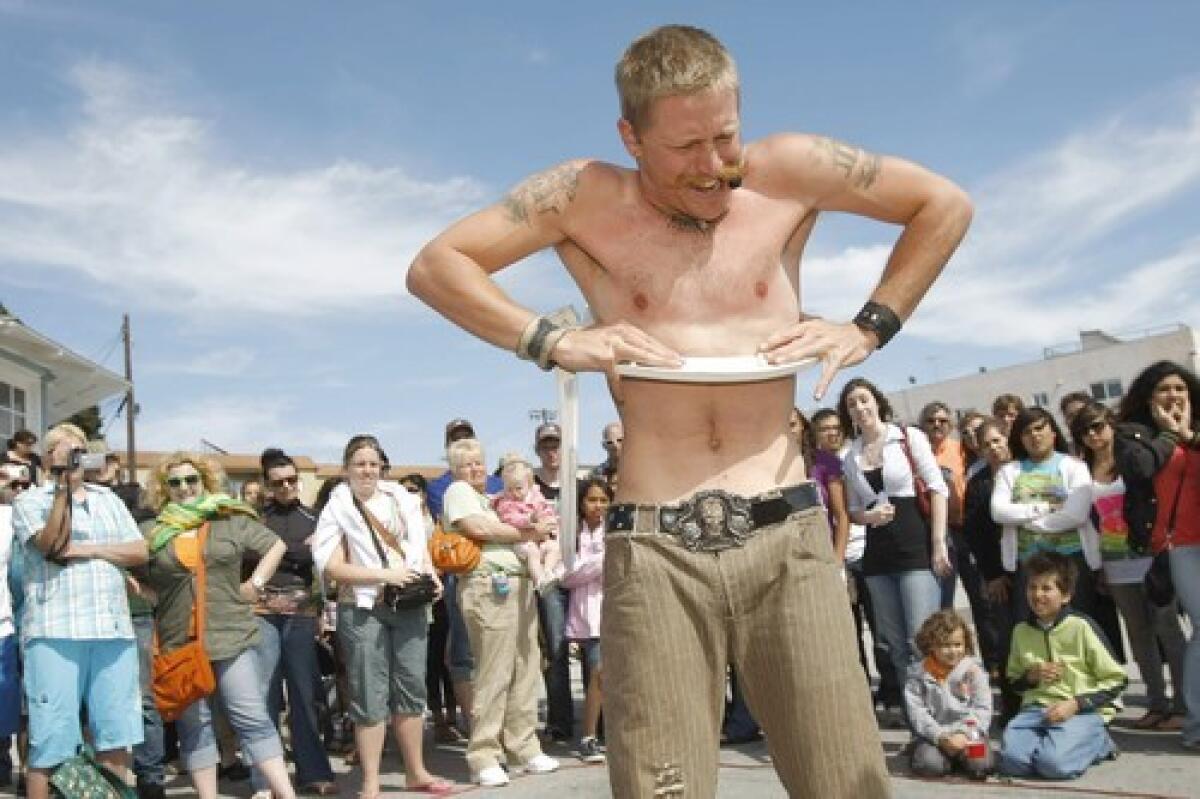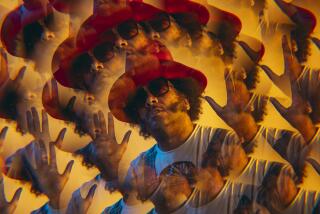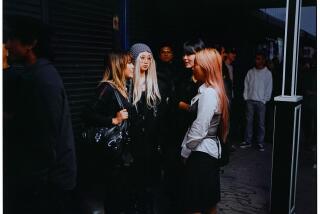Buskers take it to the streets

- Share via
Contortionist Mason Davis -- known professionally as Masonious Max -- isn’t scared of dying during his act, which includes target shooting with a whip, dislocating his shoulders to squeeze his upper body through a toilet seat and retrieving items from a loaded bear trap using his teeth.
But Davis, who began his career in Seattle as a circus performer, used to live in fear of what street performers call “The Death.” Davis, who often works Venice Beach, describes it as the uneasy period when a street artist is learning how to draw a crowd, deliver a joke and keep an audience spellbound until it’s over.
“It takes a certain amount of guts to do that,” he says. “I know a lot of people in the circus world who won’t ever do the street because they’re frightened of The Death; it’s easier to do the performance when someone has paid for their ticket and will be in their seat until the end.”
Davis, 32, is a busker, which today’s street artists prefer to call themselves. The term “busking” means performing in the streets, usually for money from the crowd. These days, busking is growing into an organized art form, with a healthy underground network, professional associations and busking festivals around the globe.
That list includes the third annual Seaport Village Spring Busker Festival in San Diego today and Sunday. There Davis will join other jugglers, comedians, daredevils, sword swallowers, musicians and the like at bayside festivities. The public may attend free of charge.
“Everyone says, ‘What the heck is a busker?’ ” says Terry Hall, general manager of Seaport Village. The festival gives the artists an annual showcase, but buskers hang out at Seaport Village year-round.
Others coming to town this year include pogo stick and unicycle performer Wacky Chad; the clowning duo Mango and Dango, who were among the winners in the first San Diego festival; and Jimmy Talksalot, who -- surprise -- includes mime in his act. Also attending is Murrugun the Mystic, who swallows swords and fire and naps on a bed of nails.
Although buskers say they do it for love, passing the hat is part of the game. Though many rely on other earnings, they often rate their own performances by what the crowd contributes.
Booming industry
Hall and others who oversee busking festivals -- which often draw seasoned pros who can boast other income sources -- say that their enterprises are thriving, not shrinking, in today’s tough economy. Mackenzie Muldoon, entertainment and marketing director for the Toronto Scotiabank BuskerFest, which will celebrate its 10th anniversary in August, says that free entertainment tends to thrive in a down economy. “It’s the only kind of entertainment where you get to pay what it’s worth,” she says.
But Marcus Raymond, a variety artist (juggling, fire-eating, magic) who also books buskers for a shopping center in Pleasant Hill, says that today’s buskers are definitely “feeling it in the hat” with lower donations. He also says that people who might hire a clown for a kid’s birthday party in better times might now bring the guests to San Francisco’s Pier 39 to watch a busking show instead.
Stephen H. Baird, a street folk singer, puppeteer and hammer dulcimer player in the Boston area, is also head of Community Arts Advocates, which supports the busking community. Baird says that because jobs at birthday parties or weddings are drying up, more professional artists are crowding the streets to supplement their income. On the bright side, he adds, some of those performers get discovered and hired for other work while doing their act outdoors.
Davis wants to make sure buskers are seen as artists, not vagrants. “Just because I work on the street doesn’t mean I don’t have a home,” he says. “It’s really honest money. People don’t have to pay me, and they choose how much.”
Davis adds that he hasn’t yet felt the pinch of the bleak economy, pointing out that tipping a street performer is much cheaper than taking the family to a theme park. Scot Nery has a similar observation. “Performers did great during the Depression,” he said. “People pay from the heart, and they pay more than they expect.”
In his 30 years of performing, musician Mark Wenzel of Eagle Rock has watched the tricks of collecting funds become quite creative.
“I’ve seen some people who do musical acts ask people to put two quarters between their thumb and first finger and make castanets, so people already have the money in their hands,” Wenzel says. “There’s another fellow who will take a gourd and shake it and say, ‘The sound is too sharp -- I need more money to make it right.’ ” Wenzel adds that the most effective way to get the crowd to spend a dollar is to have a pretty woman lift her skirt to accept the money in her garter. “You see that at the Renaissance fairs. The old stuff is also the good stuff,” he says.
Contortionist Davis has been lucky enough to survive only on income from his street act. The Idaho native often works Venice Beach, checking a local webcam to see where crowds are gathering before venturing out.
But many other buskers, including Wenzel, get most of their income doing other work in the entertainment industry or live shows at state fairs, nightclubs and comedy venues, or at corporate events. Some even find their way into burlesque shows, including Nery, who last week could be found among the frisky females who were taking it all off -- well, most of it -- at Paladino’s club in Tarzana.
Flipping out
Nery wasn’t dropping his trousers. Instead, the gangly 30-year-old was firing up his hot plate to cook a giant pancake. Nery never splatters while mixing patter with the batter. And there’s nothing like a hot skillet to add sizzle to a juggling routine.
Such work may pay the bills, but, like many other buskers, Nery’s true love is street performing, even though the experience sometimes includes hecklers, bad weather or worse.
“My passion is computer programming,” Nery deadpans when asked why he became a busker. But, seriously: “I love performing, and I love it when I’m on the same level as the audience. I’m completely vulnerable, and that makes me the underdog. I make a show out of nothing and bring a whole bunch of people together. I can’t imagine doing anything else.”
Why pancakes? “I always liked it when my dad cooked pancakes when I was a kid; he used to only do one flip,” Nery reminisces. “I started doing magic, and when that played out, I switched to juggling, which was still sort of cheesy. I wanted to do something that people would understand. A lot of people have flipped pancakes, so they understand how hard it is; they don’t understand how hard it is to juggle seven balls.”
Nery plans to keep busking forever. “There is this mime in France who was on the street doing his mime act, and he had a heart attack in the middle of his act -- he fell over, and everybody laughed like crazy because he didn’t get up,” Nery says, offering his own goofy grin as he recounts the tale.
“The person who told me that story said, ‘Isn’t that just horrible, that he died and everybody was laughing?’ No, that was the best thing! It was when he was at his peak. It’s a great performance . . . dying in a hospital is boring.”
Davis says he relies on the camaraderie of the close-knit busking community. Early in his career, Davis found a lifeline in Lucky Diamond Rich, a New Zealander known as the world’s most tattooed man. When they met in Barcelona, Davis went to Rich with tears in his eyes and said, “ ‘I’m a street performer, and I need your help.’ He sat me down for two hours and said, ‘Jump, and a net will appear.’ I’ve used that as my mantra for the last eight years.”
Wenzel takes to the streets as the mad scientist Professor Wes Weasley and plays the theremin, an odd musical instrument that is “strummed” by moving one’s hand around the electromagnetic antenna. The theremin’s otherworldly whine is frequently used in sci-fi movies and is a signature sound in the Beach Boys’ tune “Good Vibrations.”
Wenzel, who earns much of his living working at state fairs and theme parks, describes the instrument as ideal for street performing because you don’t have to touch it to play it. “You can’t tell people, ‘Take a suck off my sax reed’; no one would let you blow into their tuba,” he says.
The main lure of the theremin is the potential for interaction, Wenzel says. “That’s really why they wanted me at the festival, it’s something that can be played with,” he says. And, he adds, that’s what today’s busking is all about. “People want to participate; they want to do it,” he says. “It has become a whole different realm now, the way people are approaching street theater.”
Instead of inspiring a crowd to gather, Wenzel looks for places where people are already gathered -- say, waiting in the cold for the Rose Parade in Pasadena.
“I really enjoy the street, right there in front of people,” he says. “When they are watching TV, they don’t get it. I’ve devoted my life to street performing.”
More to Read
The biggest entertainment stories
Get our big stories about Hollywood, film, television, music, arts, culture and more right in your inbox as soon as they publish.
You may occasionally receive promotional content from the Los Angeles Times.










